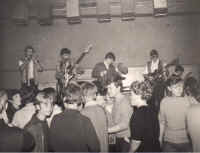….. However this was also the time when he started to get sick. At first it was no more than stomach pains, then nausea and sickness. He began to lose weight, but doctors were baffled as to the problem. One day he breezed into Jim Marshall’s shop, announcing that his illness had at last been diagnosed, simply a stomach ulcer! We were all visibly relieved.
By now I had secured a job as a trainee draughtsman at the Southern Electricity Board in Uxbridge, a great job designing electricity sub-station sites. Unfortunately the pay, six pounds and ten shillings a week, did not give me the financial clout to purchase the musical equipment that I needed. I had acquired a 1939 Austin Ten saloon car with the help of an eight quid loan from my Mum, which I was paying back at five shillings (25 pence) per week. I needed a rise!!!
I approached the boss, Mr. George Hendry, and asked for ten pounds a week. He gave me a one-word answer – no! I immediately gave two weeks’ notice and soon found a job at the local bakery, Chibnalls, as a wholesale and retail bread salesman, on a basic wage of sixteen pounds a week, plus commission. I was rich!
At the first opportunity I rushed down to Marshall’s shop where top guitarist Mick King, formerly of Cliff Bennett’s Rebel Rousers, was the new manager. I had already bought the Fender Amplifier that Micky Green had used on several Johnny Kidd hits, and I needed a guitar to match. I intended to order a white Fender Stratocaster, but Mick reminded me of the six month wait to obtain one from America and then drew my attention to what he considered a better buy, hanging on the shop wall. It was a Gibson Melody Maker, finished in yellow sunburst, and – the best part – it was only 96 guineas! Micky King added a short Bigsby Patent tremolo arm for an extra 14 guineas and I was sold!

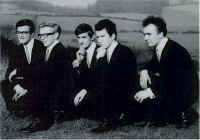
For the last couple of years I had been trawling the clubs and pubs of West London, observing and picking up tips from dozens of different bands. There had been an amazing explosion of bands – known at that time as ‘groups’ – during this period, some of the most influential being ‘The Cossacks’, ‘Frankie Reid and The Casuals’, and the uniquely named ‘Cyrano and The Bergeracs’. Watching these outfits, I realised that half of the battle was having the right equipment. Well, with the kit I had now, I was king of the hill!
During early 1963 I met another musician who was to have almost as much influence on me as Rupert. Calling himself Cliff Curtis, after the legendary Crickets guitarist Sonny Curtis, his real name was Cliff Barton, and he was lead guitarist with local group ‘Ricky Wade and the Crossfires’. Cliff took me under his wing, much as Rupert had done, teaching me guitar licks that I had previously found impossible to play. He also talked me out of any ideas I had of being the next Hank B. Marvin, and lent me a stack of records to study, by people such as Ray Charles, Chuck Berry, Ritchie Barrett and Solomon Burke. R&B was the thing, he explained. He also took me to see two bands that he considered to be the most important and influential at this time, namely Buddy Britten and the Regents and Johnny Kidd and the Pirates, both powerhouse musical trios who paved the way for the later bands of the decade such as Cream and the Jimi Hendrix Experience. To say that I was impressed by these acts would be an understatement – I was completely blown away!! “Forget rhythm guitarists”, said Cliff, “they’re not needed!”. If anyone had suggested at this time that I would become a member of one or both of these bands, I would have said that they were crazy!
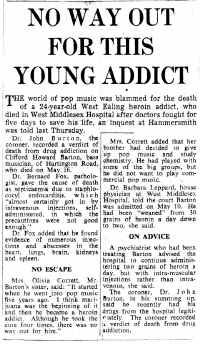 Once Cliff Barton had converted me to his way of playing and thinking, I was eager to impart my new found knowledge to the Delta 5, but my suggestions were only well received by the rhythm section, the other two being committed to being ‘all round entertainers’. My commitment to these new sounds led to several of us having a clandestine rehearsal with a couple of other like-minded musicians, including a great singer called Roger Peacock. Of course we were soon found out, and so the Delta 5 collapsed. I did feel a little guilty for a while, but not for long. I can remember feeling really honoured to receive a call from Cliff Barton, suggesting that we form a new group with me playing guitar and Cliff on vocals. With old friend Alan Hill on rhythm guitar and harmonica, and the bass and drums from the Delta 5, we proceeded to rehearse at Perivale Youth Club, in the school hall.
Once Cliff Barton had converted me to his way of playing and thinking, I was eager to impart my new found knowledge to the Delta 5, but my suggestions were only well received by the rhythm section, the other two being committed to being ‘all round entertainers’. My commitment to these new sounds led to several of us having a clandestine rehearsal with a couple of other like-minded musicians, including a great singer called Roger Peacock. Of course we were soon found out, and so the Delta 5 collapsed. I did feel a little guilty for a while, but not for long. I can remember feeling really honoured to receive a call from Cliff Barton, suggesting that we form a new group with me playing guitar and Cliff on vocals. With old friend Alan Hill on rhythm guitar and harmonica, and the bass and drums from the Delta 5, we proceeded to rehearse at Perivale Youth Club, in the school hall.
A couple of rehearsals later, it became obvious that we were not coming up to Cliff’s expectations and we decided to call it a day! Sadly, I saw little of Cliff after that. He went on to take up bass guitar and double bass, working with Cyril Davies, Long John Baldry and Georgie Fame. He soon established himself as one of England’s greatest bassists. Sadly, it seems that he also embraced the drug culture, and about four years later, whilst celebrating the success of ‘Hush’ with the other members of Deep Purple, I was shocked to spot a small paragraph inside the London Evening News, reporting Cliff’s death at the age of 24 years.
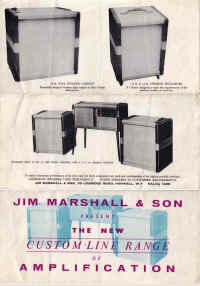 Paul Tait, Alan Hill and I decided that we would stay together and form a new group founded on the style that Cliff Barton had taught us. After a bit of shuffling we found a good singer from West Drayton called Dave Taylor, who sang in the Cliff Bennett style. Just what we wanted! Then a talented pianist called Steve Cameron, from Greenford, turned up. All that we needed now was a bass player. However, bass players then were a rarity, whilst lead guitarists were ten a penny, and most of them better than me! The solution was obvious. Back to Jim Marshall’s shop I went and traded my gear in for a second-hand Fender Precision bass, and a brand new 50-watt bass amp with a 4×12 speaker cabinet. Finished in white rexine, it was one the first, if not the first bass rig, the design of which Marshalls still sell to this day. With the addition of ace guitarist Mike Payne, ‘Some Other Guys’ were born.
Paul Tait, Alan Hill and I decided that we would stay together and form a new group founded on the style that Cliff Barton had taught us. After a bit of shuffling we found a good singer from West Drayton called Dave Taylor, who sang in the Cliff Bennett style. Just what we wanted! Then a talented pianist called Steve Cameron, from Greenford, turned up. All that we needed now was a bass player. However, bass players then were a rarity, whilst lead guitarists were ten a penny, and most of them better than me! The solution was obvious. Back to Jim Marshall’s shop I went and traded my gear in for a second-hand Fender Precision bass, and a brand new 50-watt bass amp with a 4×12 speaker cabinet. Finished in white rexine, it was one the first, if not the first bass rig, the design of which Marshalls still sell to this day. With the addition of ace guitarist Mike Payne, ‘Some Other Guys’ were born.
Drawing on everything that Rupert Ross had shown me, I began to make the transition to bass player. ‘Some Other Guys’ really clicked together, and after playing a few well-received gigs, it began to dawn on us that we really had something!
Meanwhile Rupert, although obviously still very ill, had landed a gig with vocalist Jimmy Justice. Jimmy had enjoyed several top ten hits and was at the top of his game, being about to embark on a tour of Holland. “Rupert’s moving up the ladder”, observed one of his former Flintstones colleagues.
By this time the unsociable hours of being a bread salesman were clashing with the life of a semi-pro musician. I wasn’t the most popular salesman at Chibnalls, having driven the 8 feet high van under a 7 feet high arch, tearing off half of the roof, so I thought it was time for a change of career.
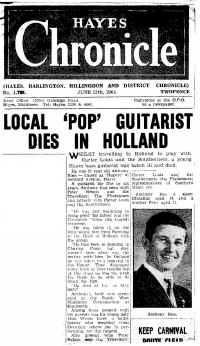 Having secured an interview for a job in a London office, I set off early. With time to spare I called into Jim Marshall’s shop and engaged in small talk with ex-Flintstones guitarist/singer Rod Freeman. After several minutes the phone rang, and I watched Rod visibly wilt with the news. On the phone was Rich Bennett, my old Renegade pal, calling to announce that Tony Ross was dead. He had died of cancer in Holland whilst touring with Jimmy Justice. Needless to say, I never got to the job interview!!!
Having secured an interview for a job in a London office, I set off early. With time to spare I called into Jim Marshall’s shop and engaged in small talk with ex-Flintstones guitarist/singer Rod Freeman. After several minutes the phone rang, and I watched Rod visibly wilt with the news. On the phone was Rich Bennett, my old Renegade pal, calling to announce that Tony Ross was dead. He had died of cancer in Holland whilst touring with Jimmy Justice. Needless to say, I never got to the job interview!!!
| Chapter 3 ← | → Chapter 5 |

